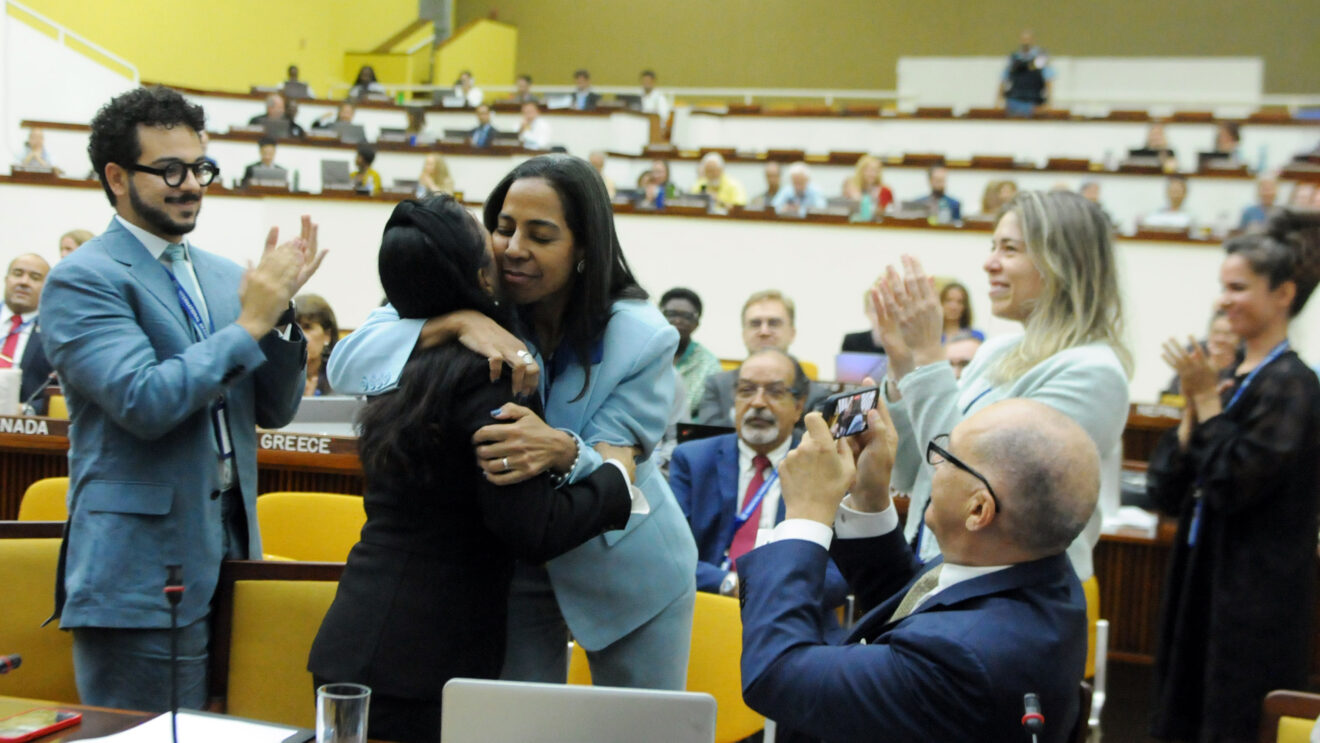An Election that Could Change the Future of the Deep Sea

Image – The Brazilian delegation celebrates the election of Leticia Reis de Carvalho as the new ISA Secretary-General.
Credit – IISD/ENB – Diego Noguera
By: Nicole Zanesco | August 29, 2024
On August 2nd, 2024, states at the ISA gathered and voted to elect a Secretary General—but this was no ordinary election. In fact, the recent International Seabed Authority (ISA) meeting culminated in one of the most important elections you probably haven’t heard about for a position you might not be familiar with. And what happened could have major implications for the ocean.
Like most international institutions, the ISA is overseen by a Secretary General (sometimes called a “Director General” in other bodies). This person is responsible for supporting the work of the State Parties, running the Secretariat, and being a neutral civil servant who responds to the guidance of the states. Every four years the ISA elects (or re-elects) a Secretary General. Typically, Secretary Generals only have two terms in the role.
The incumbent, a British lawyer named Michael Lodge, was running for a third term. Lodge’s re-election campaign was plagued by articles and even a Last Week Tonight episode documenting his close ties to industry, concerns over financial mismanagement, and the need for the ISA to evolve and respond to the climate and biodiversity crises. He faced off against Brazil’s Letitia Carvalho, an oceanographer and diplomat whose campaign centered on transparency, environmental stewardship, and good governance. No Secretary General election in the history of the ISA experienced so much media attention, and none were poised on such a precarious point.
At stake is not only the future of the ISA as an institution, but the future of the international seabed—also known as the Common Heritage of Humankind. The ISA, once operating under the assumption it would birth and oversee the deep sea mining industry, is now at the heart of the debate over whether or not we should mine the deep sea at all. In the midst of this debate, the ISA is buckling under pressure from mining proponents to finish the Mining Code, which would establish regulations under which mining could proceed, as well as the threat of a mining application (within the next year) from The Metals Company in the absence of rules to govern the industry.
New stakeholders are also attending ISA meetings, demanding that science, traditional knowledge, and the rights of future generations be considered and prioritized over a financial boon for a few corporations. The candidate who inherits this ISA inherits all of its conflicts and uncertainties.
On the last day of the meeting, the election was held. States and observers alike sat in the yellow chairs that fill the conference room, waiting with bated breath to see how the election would play out.
Besides the result itself, one of the great uncertainties was whether the election would be formal or informal. There is a difference between an informal and formal vote. Under a formal vote, the vote breakdown is counted and announced, making it public record how much the winning candidate was elected by. Four years ago, during the last election, there were not enough states present and voting to meet quorum. This means the vote was informal. Support for both candidates was judged, and the candidate with less support removed himself from the race. Michael Lodge was announced the consensus winner.
This time, the ISA room was full. So full an overflow room needed to be set up. States who could not attend the meeting organized and sent proxy votes. The world was paying attention.
Everyone was told to stay in their seats, the wooden ballot boxes were shown to the room, and the President of the Assembly (who oversees the Assembly meetings and is elected from a different regional group every session) was ready to start the voting procedure. Canada intervened, requesting that the vote be made formal. They cited the fact they had a quorum, as well as the need for a transparent and legitimate process. Other states resisted, wanting an informal vote, but without a procedural reason to do so, the President declared a formal vote. Canada catalyzed what may go down as a historic moment for transparency at the ISA.
As the ballots were passed around, filled out, and then collected, nobody spoke or moved. Time passed into the lunch break, everyone quietly watching the voting, and still nobody stirred until every filled ballot was secured in the boxes. While the votes were counted a few people ran—really ran—to get coffee and lunch as others spoke quietly in the hallway. Some stayed in their seats, exhilarated by the vote and anxiously awaiting the outcome.
When the session resumed, the President of the Assembly announced the vote breakdown. One hundred and thirteen votes cast, no abstentions. Seventy-nine votes for Carvalho and 34 for Lodge. After eight years, a new Secretary General was elected. For the first time a marine scientist would be at the helm of the ISA. For the first time a woman would be Secretary General.
The ISA is wading deeper and deeper into contentious waters, for which new voices and ideas are sorely needed to navigate. The ISA is in a new era with a new leader, and, if the energy in the room once the results were announced was anything to go by, the future of the ISA might be looking a little bit brighter.
Nicole Zanesco is Oceans North’s international policy advisor.
